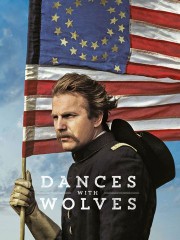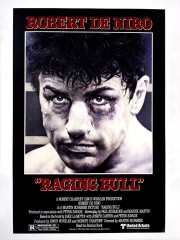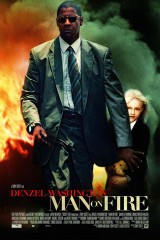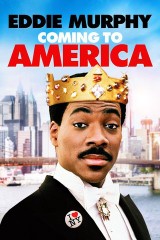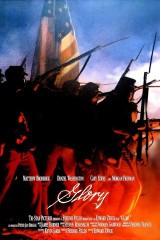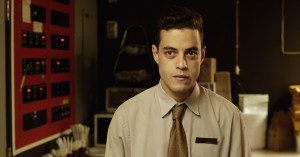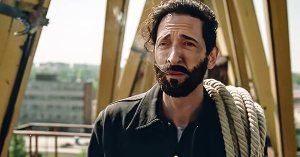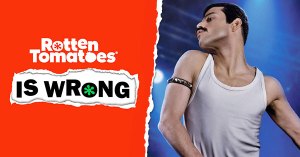John David Washington’s Five Favorite Films
The star of Spike Lee's BlacKkKlansman and this week's Monsters and Men talks Raging Bull, Coming to America, and why watching his father was "like magic."

(Photo by Valery Hache/Getty Images)
John David Washington is much more than just the son of his famous father (namely Denzel, in case that wasn’t obvious), and his star is quickly rising. After he spent a few years playing professional football, he turned his attention to acting and promptly a landed a plum gig in 2015 starring alongside Dwayne Johnson in the HBO series Ballers, currently in the middle of its fourth season. Earlier this year, he helped Spike Lee — who collaborated several times with his father on movies like Malcolm X and Inside Man — score some of the best reviews of the acclaimed director’s career with a breakout role in BlacKkKlansman, potentially signalling a new era of Lee-Washington projects.
This week, he takes another step toward establishing himself as a talent to watch, as he stars in a provocative drama called Monsters and Men. Written and directed by Reinaldo Marcus Green, the film revolves around an officer-involved shooting that affects the lives of three young men connected to the incident in very different ways. Washington, who plays a black cop torn between his professional responsibilities and the moral implications of the shooting, took some time to speak with Rotten Tomatoes about his Five Favorite Films, noting that “it’ll definitely change if you ask me this question next month.” He also talked about what it was like to grow up with a Hollywood dad and the key couple of his father’s performances that made him want to pursue acting,
Ryan Fujitani for Rotten Tomatoes: People may not know this, but you actually technically got your start acting as, what, a 10-year-old in Spike Lee’s Malcolm X?
John David Washington: I was six. Malcolm X. See, that’s on the list, too, by the way, but again, that was last month. If you asked me last month, I would’ve said Malcolm X. Yeah, I was six years old, man.
RT: Obviously, your father was the star of that film, and it made me wonder. Was your dad the type of Hollywood dad who would always take you on the set of his movies?
Washington: I did get to go on a couple sets. I got to go on the set of Glory, Malcolm X. I got to go on the set of Virtuosity. Yeah, he’d bring me around. I loved it. I wanted to be there. I got to get behind the tank in the movie Courage Under Fire, another Ed Zwick film. I got behind the tank that he fired, and I got to fire a 50-caliber or 60-caliber gun. It was amazing. I got the pictures in my room. Yeah, I was around sets like that, to be a part of it. I got to see it, and I loved it.
RT: Did that contribute to you picking up the acting bug?
Washington: The reason was Shakespeare in the Park, which my father did. He did Richard III. And then it was Glory. That’s when I saw him talk different from when he was reciting lines to being on that stage reciting those Shakespearean words, and then when I saw the whip marks on his back, and he’d come home. And when I saw him die in the film, and then we would play around and he would fake death in front of me as a kid. I thought that was the coolest magic trick ever. I was just into it. So I just wanted to do it after that.
It just seemed like magic, you know? Seeing those guys on screen. Even Dances with Wolves, some of those films I’ve named, that’s what it was. It just seemed like magic. You know, when you add the beautiful music, the score, to these beautiful scenes and these shots, the landscape, you just lose yourself in these worlds and in these people. I just wanted to make people feel the way I felt as a kid watching these films.
RT: In that case, it was probably a little too early, but did you feel like you experienced or learned anything from being on those sets that you were able to incorporate into your acting?
Washington: Then? Not so much. I just remember it all being everybody working so diligently. Everybody’s moving around, doing stuff, and I love that kind of activity. But there was a lot more that I learned in football, probably, that I’m applying to the craft now.
RT: You’re having a great year so far, with the success of BlacKkKlansman, and this week you’re in two movies: The Old Man & the Gun and Monsters and Men. Speaking specifically about the latter, did you get a chance to see the film Blindspotting earlier this year?
Washington: I haven’t yet. No, I need to.
RT: Like Monsters and Men, that film also revolves around a similar police shooting incident, but your film offers three perspectives from three different men connected to the shooting. With that in mind, being that Monsters and Men offers these three different perspectives, what, to you, is the most important message that audiences take away from the movie?
Washington: Understanding. Understanding and, I think, that word: perspective. There are a lot of people in this world that want the same thing, and they go on about ways to do it differently. So whatever the language of coexistence is, maybe they can find it after they see this film.
Monsters and Men opens in limited release on Friday, September 28.


